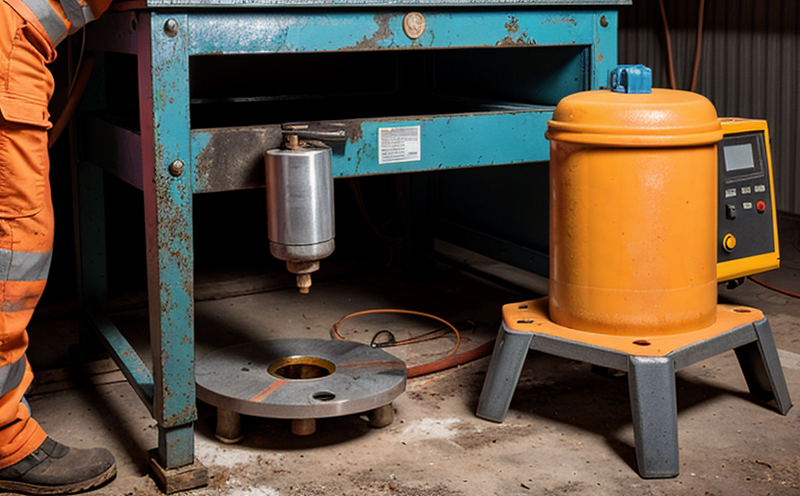ISO 23278 Magnetic Particle Testing Acceptance Criteria
The ISO 23278 standard outlines acceptance criteria and evaluation methods for magnetic particle testing (MPI) in the aerospace and aviation sectors. This method is critical for ensuring that materials used in these high-stress environments meet stringent quality standards, thereby enhancing safety and reliability.
Magnetic Particle Testing (MPI), as specified by ISO 23278, involves applying a magnetic field to ferromagnetic materials to detect surface and near-surface flaws. This technique is particularly useful for identifying cracks, voids, and other defects that could compromise the integrity of critical components. The aerospace industry relies heavily on MPI due to the need for flawless parts in high-stress environments where failures can be catastrophic.
The acceptance criteria defined by ISO 23278 are designed to ensure that the results of the test meet specific thresholds, ensuring that only materials with acceptable levels of defects pass inspection. This standard is essential for quality managers and compliance officers who must adhere to international standards to maintain certification and comply with regulations.
The process begins with specimen preparation, which involves cleaning and degaussing the component to be tested. Once prepared, the part undergoes MPI using a suitable magnetic field generator and appropriate magnetizing techniques. The testing process is followed by visual inspection of the component for indications of defects. The acceptance criteria specify that only components exhibiting acceptable defect levels can proceed.
The standard also provides detailed guidance on the type of equipment needed, including magnetic powder or liquid penetrant materials, as well as the specific parameters required during the test. Proper calibration and maintenance of this equipment are crucial to ensure accurate results. Additionally, the document outlines the reporting requirements for MPI results, which include a description of the defect characteristics, their location, and severity.
Magnetic Particle Testing (MPI) is widely used in aerospace manufacturing processes where defects can have severe consequences. By adhering to ISO 23278, manufacturers can ensure that only components with acceptable levels of flaws are incorporated into aircraft, engines, and other critical systems. This not only enhances safety but also ensures compliance with international standards.
- Specimen preparation: Cleaning and degaussing the component.
- Magnetic field application: Using a suitable magnetic field generator.
- Defect identification: Visual inspection for indications of defects.
- Acceptance criteria: Only components meeting specified defect thresholds pass.
- Equipment calibration: Ensuring accuracy and reliability of test results.
The use of ISO 23278 ensures that the aerospace industry can maintain high standards of quality, thereby enhancing safety and reliability. By adhering to this standard, manufacturers can ensure that only components with acceptable levels of defects are used in critical applications.
Why It Matters
The significance of ISO 23278 lies in its role as a benchmark for ensuring the integrity and reliability of materials used in aerospace and aviation. By adhering to this standard, manufacturers can ensure that only components with acceptable levels of defects are incorporated into aircraft, engines, and other critical systems.
Failure to meet these criteria could lead to catastrophic failures in high-stress environments where even minor flaws can have severe consequences. The aerospace industry places a premium on reliability and safety, making compliance with ISO 23278 essential for maintaining certification and ensuring regulatory compliance.
The acceptance criteria specified by the standard are designed to catch defects that could compromise the integrity of critical components. This not only enhances safety but also ensures that products meet international standards, thereby fostering trust among customers and stakeholders.
By adhering to ISO 23278, manufacturers can ensure that their processes meet stringent quality requirements, thereby enhancing customer confidence in the reliability and safety of their products. This is crucial for maintaining a competitive edge in an industry where even minor flaws could have significant consequences.
Eurolab Advantages
Eurolab offers comprehensive ISO 23278 Magnetic Particle Testing Acceptance Criteria services tailored to the aerospace and aviation sectors. Our team of experts ensures that all tests are conducted in accordance with international standards, providing accurate and reliable results.
- Comprehensive testing capabilities: We offer a wide range of MPI equipment and expertise.
- Expertise in aerospace materials: Our team has extensive experience in working with ferromagnetic materials used in the aerospace industry.
- Regulatory compliance: Ensuring that all tests meet international standards.
- Quality assurance: Providing detailed reports on test results, including defect characteristics and locations.
Eurolab's commitment to quality and safety is reflected in our adherence to ISO 23278. Our services are designed to help manufacturers maintain high standards of reliability and safety, thereby enhancing customer confidence in the products they produce.
Customer Impact and Satisfaction
Eurolab's adherence to ISO 23278 ensures that our customers receive accurate, reliable, and compliant test results. This enhances their ability to maintain certification and comply with regulations, thereby fostering trust among stakeholders.
- Increased customer confidence: Reliable test results enhance customer trust in the products they produce.
- Maintaining certification: Compliance with international standards ensures that products meet regulatory requirements.
- Enhanced safety: By adhering to ISO 23278, manufacturers can ensure that only components with acceptable levels of defects are incorporated into critical systems.
- Simplified compliance processes: Our services streamline the testing process, making it easier for customers to comply with international standards.
Our commitment to quality and safety is reflected in our adherence to ISO 23278. By providing accurate and reliable test results, we help our customers maintain high standards of reliability and safety, thereby enhancing customer confidence in the products they produce.





